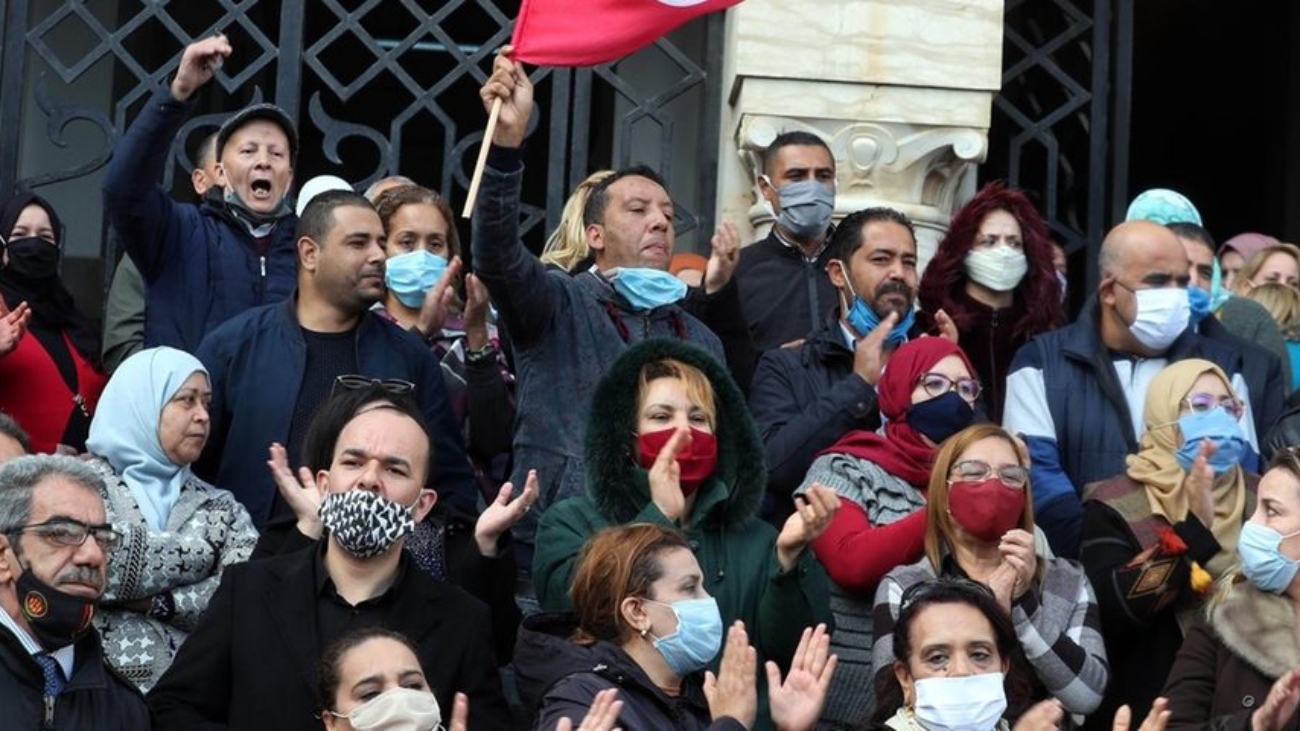The coronavirus crisis has exacerbated the country’s financial problems, prompting protests and political division
This piece was originally published on the thenationanewsl website https://thenationalnews.com/
Tunisia’s dramatic economic downturn since the coronavirus pandemic has exacerbated social and financial woes facing the country, prompting the influential Tunisian General Labour Union, (UGTT) to call on the country’s president, Kais Saied for a National Dialogue to address mounting concern.
In November, the international ratings agency, Fitch, downgraded Tunisia’s credit rating from ‘stable’ to ‘negative,’ reflecting the deteriorating outlook for a country saddled with millions in international debt.
Perhaps of more immediate concern to many within Tunisia is the joint study earlier this year by Tunisia’s central bank and the UNDP predicting that unemployment, a long-time driver of social unrest, is expected to increase from 15 to 21.6 per cent by the year’s end.
Though Tunisia’s winter months are often witness to predominantly peaceful demonstrations, the combination of deteriorating social, health and economic resources have made the current round of protests especially significant.
Recent weeks have seen simmering unrest over unemployment and living conditions transform into vocal protest at the phosphate mines in the southern towns of Gafsa, Kairouan and across the country’s neglected interior regions.
In the capital, the country’s professional unions are on the march, with journalists’ and lawyers’ unions calling for improvements in the conditions of their members. Dwarfing all is the uncertain future of the country’s national carrier, TunisAir, which, already struggling before the pandemic, now stands on the point of insolvency.
Tunisia has experienced three governments since inconclusive results in last year’s legislative elections provided the country with a divided and fractious assembly.
In September, the expectation had been that incoming Head of Government, Prime Minister Hichem Mechichi, initially seen as a close ally of the President, would form a technocratic government. However, progress towards significant reform since parliament voted confidence in his proposed cabinet has been underwhelming.
Into this mix the Tunisian General Labour Union is now asserting itself. Boasting a membership equal to around half a million, (around five per cent of the country) and an ancestry reaching back to 1946, the union has proven itself more of a durable presence than many of the country’s sometimes fleeting political parties.
With branch offices in nearly every Tunisian town, the UGTT draws its membership from across Tunisian society. In 2013, its influence was such that it was able to initiate a similar national dialogue that steered the country through one of its most significant crises since the 2011 revolution, later earning all four bodies the Nobel Peace prize.
Under the UGTT’s proposals, a National Dialogue committee would be formed from figures outside the political sphere under the auspices of the President, establishing a model distinct from the legislature and closer to Kais Saied’s own vision for a more direct democracy.
“I trust the UGTT more because it’s closer to the people,” Hazel Ezzadine, a 59 – year-old civil servant from the southern town of Tataouine told The National, “We had had the government taking the lead before the Revolution. Now, it’s time to trust the sides that are closer to the people.
“The government may be serving foreign agendas,” he added, referring to the government’s obligations to the IMF and foreign lenders, “but the UGTT is ours.”
Nevertheless, for observers such as Dr Elie Abouaoun, the Tunis-based director of the United States Institute for Peace’s MENA programme, these latest proposals are principally driven by the need to underscore the union’s legitimacy and recover some of its grass roots connections.
Recent protests in Tunisia’s south, he said, indicated that “the UGTT does not enjoy the same influence in all the places at all times. So in some way, they need to maintain their posture as the main social actor.”
While uncertain how the President would respond, Dr Abouaoun was clear of the value such a proposal would bring. “Irrespective of the model and the actors, I see the value of a genuine inclusive dialogue that will address all the outstanding economic and social issues,” he said.
For the dialogue to succeed, it must reach beyond the capital Tunis and include figures from across the country, “Local community figures need to be engaged, develop understanding of the real issues and be part of the solution rather than just being recipients of help and advice,” he said.
However, facing this are the expectations of most of the populace which, he cautioned, may be at odds with the resources of an economically straightened government heavily reliant upon international support. “Therefore, what is crucial now for the executive power in Tunisia is to think how to set the expectations at the right level and to stay away from the prevailing tendency to just provide promises as a response to social grievances.
“The Tunisians deserve being told the truth about what is possible and what is not. The reforms needed to kick-off Tunisia’s economy are painful and require including a solid and reliable social safety net,” he said, stressing the need for all involved to be clear in communicating the challenges Tunisia faces within a changing post-Covid environment, within North Africa and globally.
Nevertheless, he said, “The UGTT stands out as the most active and influential labour union in the MENA region. The absence of such active unions in other countries led to disastrous drifts that consolidated monopoly and unilateralism.”

